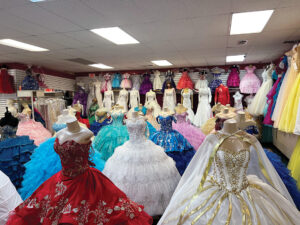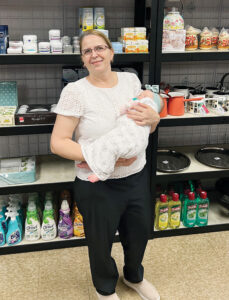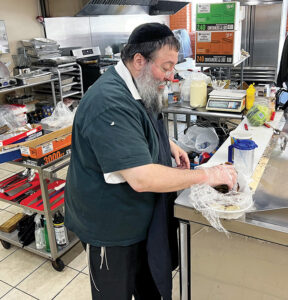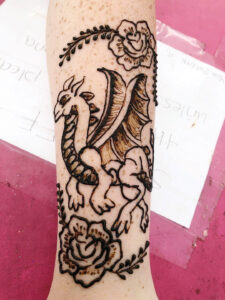Marketing to consumers by culture
7/6/2022The United States has been renowned as a cultural “melting-pot.” As the demographics of the country continue to shift, so they do in Des Moines. A nation of immigrants brings cultural practices from all over the world. To serve their own communities, many businesses in Des Moines focus on cultural elements such as food and fashion. However, it takes a diverse set of customers to be successful in today’s economy.

La Estrellita Fashion sells dresses for quinceañera and other special occasions. Photo by Colson Thayer.
La Estrellita Fashion
Located on Easton Boulevard in Des Moines, La Estrellita Fashion offers apparel of all kinds. They sell party dresses, Colombian-style jeans, Western outfits, dresses for prom or homecoming, shoes and other clothes for special events. However, unique to their business is their line of quinceañera dresses.
Quinceañera, the word derived from “quince” meaning “15” in Spanish, is the celebration of a girl’s 15th birthday. It recognizes her transition to womanhood. Latino people across the world commemorate this milestone event with a large and often lavish celebration with friends and family. Quinceañera season typically takes place in the summer — in Des Moines, April through October.
The dress is the focal point of the celebration. La Estrellita Fashion operates year-round but sells most of its dresses in the summer. Each dress reaches the floor and is made with satin, lace and rhinestones. La Estrellita offers a wide array of colors, sizes and designs.
Quinceañeras often include a court of honor. The celebrant’s peers serve as damas (dames) and chambelanes (chamberlains) who also wear special attire.
La Estrellita not only sells the dresses but full sets dedicated to the events. Typically, quinceañeras incorporate bouquets, a crown or tiara, pillow and other elements. La Estrellita offers these in a package or separately. Additionally, La Estrellita also owns a venue on East Grand Avenue to hold an event. They offer decorations and catering for those using the venue for quinceañeras.
While Patricia Chavez serves the Latino community in Des Moines, her business would not survive without a diverse range of customers.
“I think if I don’t have African customers, I don’t have the business,” she said.
Chavez relies on word of mouth to support her business, as well as returning customers. Often, girls who purchased their quinceañera dress from her come back for prom or homecoming dresses.

Minka Kajtazobic with Europa Groceries. Photo by Colson Thayer.
Europa Groceries
Europa Groceries along Merle Hay Road in Des Moines has been in business for 18 years. The original owners spent 15 years building its reputation as a prime seller of European goods in the area. When it was time for them to retire, they handed over the business to their good friends. Today, Minka Kajtazobic and her husband, son, daughter and her fiancé operate and own the grocery store.
Europa Groceries carries a variety of products directly sourced from Europe. Most of the goods are from Kajtazobic’s home country of Bosnia and former-Yugoslavia, but they have expanded to include goods from Germany, Poland, Bulgaria, Hungary, Ukraine, Russia, Greece and other countries. The products they sell include packaged goods, candies, chocolates, frozen and ready-to-eat meats, wine, cheese, sodas and coffee.
“Bosnian people drink a lot of coffee,” Kajtazobic shared. Along with the coffee, they sell coffee drinking sets with pots and cups. Kajtazobic also has a friend who makes cakes out of her home that she sells in the store.
There are other European grocery stores in the area, but Kajtazobic made a claim about the previous owners, “They’re known for the longest time.” The Kajtazobic family continues the success brought by the original owners. Kajtazobic explained she does not want much to change. Less than a year into their ownership, the world was struck by COVID-19, but the business stayed strong. Through the Internet and word of mouth, the business sees new and old faces every day. Kajtazobic explained that a lot of young people in Des Moines come in to try new things, but there are customers she sees almost daily.
“This store is not just for one type,” Kajtazobic emphasized. That is the reason why her business expands into other subcultures in Europe. While Kajtazobic is from Bosnia and that is where her expertise lies, she is more than willing to order products for anyone. She and her husband will go out to Chicago just to bring back a product they do not carry.

Rabbi Yossi Jacobson owns Maccabee’s Kosher Deli. Photo by Colson Thayer.
Maccabee’s Kosher Deli
Rabbi Yossi Jacobson defined “kosher” as “fitting and proper.” In Jewish culture, it is proper for a Jewish person to eat kosher foods. Kosher animals and meats are those that have split hooves and chew their food twice. Cows, sheep and goats are examples of kosher meats. Jacobson simplified it down to animals that do not eat their prey, or “petting zoo animals.”
Kosher comes down to the processing that ensures the foods are fitting and proper. Kosher meats must be slaughtered in the most humane way. Rabbis are trained to slaughter with a clean, sharp knife and drain all the blood out.
Jacobson owns Maccabee’s Kosher Deli on Polk Boulevard in Des Moines and claims to be the only kosher deli in the state of Iowa. The business is primarily an eatery but also sells groceries, sandwiches, sides, Jewish staples and dabbles in catering. However, no kosher processing is done in house.
“I cheat; I just get it already made,” said Jacobson. He sources his products from Agri Star, a kosher processing house in Postville, Iowa.
While he himself is a kosher-practicing Jew, there are many Jews who are not. Pew Research reported that only 17% of U.S. Jews keep kosher in their homes. Alternatively, Jacobson serves many customers who are not Jewish but practice kosher. He said he found about half of his customers are Jewish and half are not.
“I don’t just rely on the Jewish community,” he said.
Instead of viewing the deli as a business, he sees it as a resource for both Jews and non-Jews.
“Many people feel this is not just a kosher deli, but it’s such a welcoming arena for everyone to bring their platform on my stage.”

Markeeta Brown operates Voila Hair Salon in Merle Hay Mall. Photo by Colson Thayer.
Voila Hair Salon
African hair is generally characterized by its tightly coiled, upward-growing nature. While some may prefer to have their hair done by someone with hair similar to their own, a lesson taught in beauty school is “hair is hair.” No matter one’s ethnicity, everybody’s hair is different. Markeeta Brown, owner of Voila Hair Salon in Merle Hay Mall, operates her salon with that lesson in mind.
Brown primarily serves Black customers — she estimated that 90% of her customers are Black. However, she will do anybody’s hair. Hairstyling basics apply to all hair. To stay relevant and up to date, Brown attends hair shows and online classes.
Brown has been a hairstylist since 2004, but this is her third year at Merle Hay Mall. Her location in the mall has helped her business grow. Mall walkers often stop by and inquire. Sometimes they ask if she only does Black hair, but she will assure them she can do anyone’s.
Besides hairstyling, Brown sells hair care products. She carries her own line of hair growth oil and edge tamer.
“In Des Moines, there’s a lot of African American hair stylists,” Brown said. Being in the field, she knows the majority of hair stylists around the area. However, in other areas, Brown is concerned there may be a lack of stylists with knowledge about African hair.

Divya Grimes enjoys experimenting with her non-traditional henna designs. Photo courtesy of Iowa Henna.
Iowa Henna
When she was 14 years old, Divya Grimes visited India with her family. When she arrived, her sister-in-law wanted to show her something “cool.”
“We kind of joke, it just kind of not only seeped into my skin but seeped into my brain,” Grimes shared.
Her sister-in-law introduced her to henna, the practice of temporarily staining skin with dye prepared from plants. For 25 years, Grimes has solely owned and operated her business Iowa Henna. Iowa Henna uses natural henna as opposed to chemical products. Grimes attends a wide variety of events, festivals and celebrations to share her henna talent with fellow Iowans.
“I started off doing an Asian festival, and it just expanded into one thing after another,” Grimes explained.
Grimes offers to do henna for anyone older than the age of 3. She also does face paint and sells sewn clothes and other trinkets at her stand.
Grimes will do almost any design. She began with traditional Indian designs she learned from books, practicing until she could do them from memory. Today, she asks her customers to challenge her. At Capital City Pride 2022 in Des Moines, a customer asked Grimes to do a panda, and so she did a red panda design.
“The coolest thing is with henna versus a real tattoo — if I goof up, I can wipe it off and start again,” she said.
More and more people recognize henna from social media.
“Back then, I was explaining more than I was actually doing it. Now it’s the opposite,” Grimes reflected.
“It really pulls together all these different races and cultures and people,” Grimes said. She has friends online from all over the world who practice henna. At the events she goes to, there is not only one group of customers, but a variety of ages and ethnicities.
Henna grows in China, India, the Middle East and northern Africa. Each of these places use different techniques and designs for different purposes.
“In our Indian culture, we do it mostly for weddings, and it’s to ward off the evil eye,” Grimes said. Nowadays, henna appears at all sorts of events including weddings, baby showers, music festivals, small-town events and generally positive occasions. ♦





















